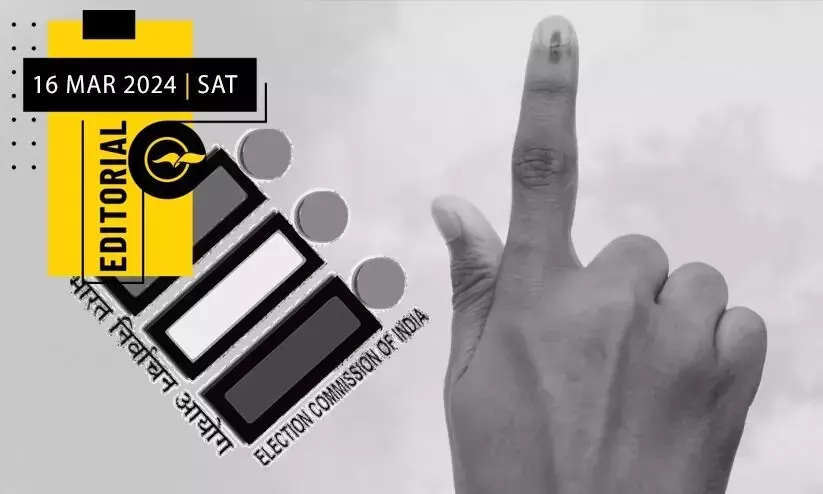
How free will the general election be?
text_fieldsThe first general election after the Election Commission which is supposed to be an independent institution was brought under the complete control of the central government through a controversial law, in the world's largest democracy is set to be announced today. The election comes at a time when a small group of civil society members have courageously raised their voices against the extremely unfortunate situation of democracy being overthrown by plutocracy, and the Supreme Court has risen to the occasion. The details of the contributions to the Electoral Bond scheme, a completely opaque scheme devised by the Narendra Modi government, which claimed to bring transparency in election funding, were revealed yesterday. The Supreme Court, which struck down the Electoral Bond on February 15, directed the State Bank of India to submit the details of the bonds sold to date and the names of the contributors and buyers to the Election Commission within a month. Even after the verdict, the BJP government, which justified the bond, tried all sorts of tricks to prevent the information from coming out before the general elections, but to no avail as the Supreme Court stood its ground. A glance at the names of the generous contributors and the size of the amounts makes it clear why the BJP and SBI were so apprehensive about this. Of the bonds sold between April 1, 2019, and February 15, 2024, 22,030 have been encashed by political parties. The ruling BJP is the main beneficiary. Other major parties, including the Trinamool Congress, Congress, DMK, BJD, and TRS, which are in power in various states, have also received a share. The CPM and CPI, which have opposed the Electoral Bond scheme from the beginning, have not received a single rupee in this way.
The crux of the matter lies not in the list of those who bought the bonds, but in the list of donors. The controversial lottery businessman Santiago Martin's Future Gaming and Hotels is the entity that bought the most bonds. They have donated Rs 1,368 crore worth of bonds to political parties. Other top companies on the bond list are Megh Engineering and Infrastructure Limited (Rs 966 crore), Quick Supply Chain Private Limited (Rs 410 crore), Haldia Energy Limited (Rs 377 crore), and Vedanta Limited (Rs 376 crore). It is noteworthy that many companies with a history of irregular activities and illegal transactions have made significant contributions to this "transparent" effort "to strengthen Indian democracy". Many organisations, including Santiago Martin's, made donations after being raided by the ED or the Income Tax Department. Shouldn't this be called extortion using government agencies? Just as opposition leaders facing corruption charges are hailed as clean once they change parties, tainted businessmen gain immunity once the money reaches the party coffers.
At first glance of the list, it seems that two business groups known to be cronies of the central government are not parties to it. However, many of the companies that donated are dependents of these two wealthy businessmen. A number of shell companies have also funnelled donations under cover of an amendment deliberately made to the Companies Act. When we look at who gave them the money, the cunning of this crony capitalism becomes clear. Through the intriguing scheme of electoral bonds, the central government has subverted the principles of democracy, ethical governance, and entrepreneurship. If the Supreme Court's directive to disclose the names of those who received the donations is implemented, this will come to light as clear as day. It is also certain that the Citizenship Amendment Act was brought up abruptly to avoid discussions about the illegality of the bond.
The concern that is raised is whether the upcoming elections, in which an immeasurable amount of tainted money has been pumped, can be called free and fair. There is also a demand from a pro-government quarter corner that the bond verdict be revisited. The only way to cleanse this process even a little bit in addition to stopping and disclosing it, is to confiscate the money earned by political parties through electoral bonds and to deposit it in the public coffers.






















